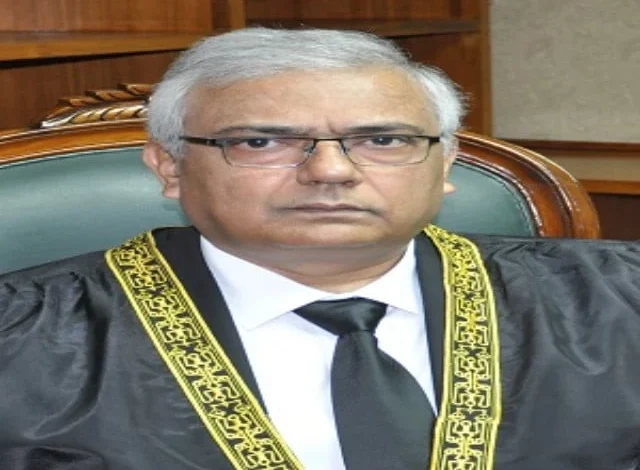In the 26th Amendment case, the SC considers a complete court plea.

Senior attorney Hamid Khan was consulted over the bench’s composition as the Supreme Court’s Constitutional Bench heard arguments in the appeal against the 26th Constitutional Amendment on Wednesday.
The hearing was held before an eight-member constitutional bench led by Justice Aminuddin Khan. The Supreme Court’s official YouTube channel aired live coverage of the sessions.
Advocate Hamid Khan, speaking on behalf of the Lahore High Court Bar Association and Lahore Bar Association, protested the constitutional bench’s makeup during the hearing and demanded that a full court with eight additional justices be established.
Hamid Khan argued that last year, the 26th Amendment was rushed through the legislative process and introduced late at night. However, Justice Aminuddin instructed him to help the court with the bench configuration issue first.
When Justice Jamal Mandokhail said that the merits of the amendment should be put aside for the time being, Hamid Khan clarified that he was only outlining the facts and not talking about the case’s core issues.
He maintained that a full court, consisting of sixteen judges as it existed before the 26th Amendment, should hear the issue. He asked that the present bench include the remaining eight judges from that era.
Justice Aminuddin noted that a constitutional amendment remained a part of the Constitution until it was declared invalid, therefore the arguments should continue with that acceptance. While Justice Musarrat Hilali noted that the amendment had not been suspended, Justice Mandokhail reminded the attorney that he was sitting before a bench established under the same amendment.
Hamid Khan reiterated his position, claiming that the 26th Amendment was enacted in a hurry and without enough discussion. He was informed by Justice Aminuddin, however, that those arguments were pertinent to the main case and ought to be made later.
Hamid Khan insisted that he was only talking about the process by which the amendment was accepted, notwithstanding the importance of the matter. He was advised by Justice Mandokhail to carry on with the arguments centered on the bench’s composition.
Justice Aminuddin reaffirmed that the court and the attorneys relied on the Constitution in its current form, emphasizing that it must be upheld in its current form until it is modified. Justice Hilali pointed out that the petitioner had acknowledged the amendment as a part of the Constitution by contesting it.
Justice Muhammad Ali Mazhar requested Hamid Khan to limit his arguments to the request for a full court, reminding him that the main matter was not yet being heard. Hamid Khan said that he wanted to draw attention to the amendment’s effect on judicial authority but that he was not yet talking about constitutional infractions.
He contended that the modification changed their constitution’s process and, for the first time, removed the chief justice’s power to appoint benches. Additionally, he said that it had impacted the Judicial Commission’s makeup, making judges a minority.
Justice Aminuddin asked what powers a full court could have and pointed out that the court had not yet determined which bench would hear the matter. The formation of a full court by judicial order was unrestricted, according to Justice Ayesha Malik.
She inquired as to where the 26th Amendment’s prohibition on issuing such an order was found. Justice Mazhar questioned whether the court could use Article 187 to make such an order, while Justice Naeem Akhtar Afghan noted that Hamid Khan had not made such a request in his written plea.
In response, Hamid Khan said that the court was empowered under Article 187 to guarantee full justice. Then, with a smile, Justice Mandokhail inquired as to whether Hamid Khan would be content if all Supreme Court justices were regarded as members of the constitutional bench. The attorney retorted that the 26th Amendment had established the idea of a constitutional bench.
According to Justice Mandokhail, the provision was drafted by legislators, not the judiciary. Hamid Khan once recommended that the judges temporarily ignore Article 191-A. If they did, the constitutional bench itself would vanish, Justice Mazhar joked.
In addition to asking that the remaining eight judges from that era be included, Hamid Khan restated his demand that the case be considered by the entire court as it was at the time of the 26th Amendment. The court postponed hearings until 11:30 a.m. on Thursday after hearing his concerns over the bench’s composition.